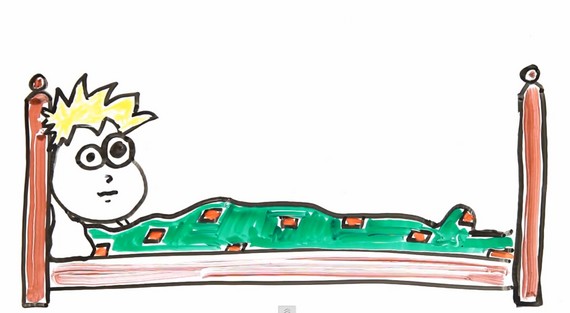The condition of sleeplessness or inability to sleep is termed as insomnia. Affected people may find it difficult to stay asleep, or fall asleep, or both, despite ample available time for sleep. Sleep requirements vary between different individuals; a majority of adults require 7 to 8 hours of nighttime sleep.
A lot of people experience sleeplessness during some time in their lives. However, some adults may suffer from chronic or prolonged insomnia. The condition may occur by itself, or it can arise due to other causes such as intake of medicines or underlying diseases.
People who are unable to sleep typically wake up in an unrefreshed state. This can affect the daily functioning, job performance, the mood and energy levels, the general health and the quality of life. Sleeplessness can often be easily resolved with minor changes in the daily lifestyle.
Symptoms of sleeplessness or insomnia
A few common signs and symptoms of insomnia are listed below:
- Problems in going to sleep at night
- Waking up a lot early
- Waking up during the night
- Even after sleeping during the night, patients may not feel well rested
- Depression, irritability, and/or anxiety
- Daytime sleepiness or lethargy
- Tension headaches
- More accidents and errors
- Continual stress and worrying about sleeping
- Discomfort of the gastrointestinal system
Causes of sleeplessness
People may not be able to sleep due to the following causes:
- Anxiety disorders like PTSD as well as routine anxiety can disrupt sleep and pose difficulties in falling asleep.
- Depression can cause insomnia or excessive sleepiness.
- Stress about family, job, health, school, etc. can keep the mind active at night thereby preventing sleep. Sleeplessness can also occur post/during stressful events like divorce, death of a loved one, etc.
- Presence of underlying medical conditions like GERD, cardiac or pulmonary diseases, hyperthyroidism, cancer, etc. can cause sleepless nights.
- Bad sleeping habits that include stimulating activities prior to bedtime, improper sleep patterns/schedule, a discomforting sleep environment, etc.
- Working in shifts or change in the environment can disrupt the body’s circadian rhythms, thereby causing insomnia. It may be noted that these rhythms are related to the body temperature, metabolism, and sleep-wake cycles, etc.
- Intake of certain medications like blood pressure and heart medicines, stimulants, antidepressants, etc. can also prevent normal sleep.
- Excessive eating before bedtime can cause physical discomfort when lying down. It can also result in acid reflux which can keep people awake at night.
- Drinking coffee, tea, or alcohol before bedtime. Alcohol may be a sedative, but it prevents the onset of deep sleep leading to random awakening during the night. Tea and coffee are stimulants that prevent sleep.

Treatment of insomnia: What to do when you cannot sleep?
People who cannot sleep need to address any and all causes of sleeplessness, like medicines or underlying diseases, as well as change their sleep habits to be able to have a restful and relaxing sleep. In case the issue persists, doctors may prescribe medications.Treatment options include:
1. Behavior therapies:It is the generally the first step to treating sleeplessness. It helps enhance the sleep environment and inculcate varied novel sleep behaviors. Behavioral treatments include:
- Education, wherein patients are taught varied good sleep habits such as avoidance of stimulants and arousing activities before sleeping, adherence to a proper sleep schedule, and preparing a comforting sleep environment, etc.
- Relaxation methods, wherein patients learn different ways in which anxiety can be decreased before bed, including biofeedback, progressive relaxation of muscles, and breathing exercises. Such therapies help regulate moods, heart rate, breathing, and muscle tension.
- Cognitive behavioral therapy, which promotes removal and control of concerns and stressors that prevent one from sleeping. The technique can also help eliminate unwarranted ideas about sleeping, like the thought that even one night of sleeplessness can result in illnesses.
- Controlling stimulus, wherein the amount of time spend on bed is limited to sleeping or sex, and not on activities like reading, etc.
- Paradoxical intention, or staying awake in bed. In this, patients have to get into bed and remain passively awake instead of trying or expecting to fall asleep. This will help decrease anxiety and worries.
- Restriction of sleep, wherein patients are prevented from spending relevant number of needed hours on the bed, thereby leading to partial deprivation of sleep. This causes exhaustion and sleepiness the following night. Subsequent improvement in sleep will then be rewarded with gradual increase in time spent on bed.
- Light therapy can be used to correct insomnia in people who sleep a lot earlier and awaken sooner than usual. Exposure to light can help extend the internal clock. Patients may make use of a light box or go out during late evenings (during specific times of the year) when it’s still light out.
Medications: Patients who cannot sleep can go for OTC sleep aids or prescription meds to fall asleep.
- Most OTC sleep medicines have antihistamines which cause drowsiness and then sleep. However, such sleep is of low quality. Antihistamines can also cause varied side effects such as urinary issues, confusion, daytime sleepiness, and dry mouth, etc.
- Prescription sleeping pills can help get good sleep. Even though most of these drugs are approved for use over long-term, most doctors do not recommend using them for more than a month.
Self-care guidelines: Follow the below listed tips to help sleep better.
- Keep the sleep environment as comfortable as possible, devoid of clutter. Avoid placing computers, TVs, laptops, etc. in front of the bed as the light can prevent the onset of sleep. Sound-proof the bedroom or ensure it has minimal sound, like just the soothing drone of a fan. Ensure that the room temperature is ideal for sleep.
- Regular users of medications should consult a doctor to check if the drugs contain stimulants and if they are the cause of insomnia. Then find alternative drugs.
- Limit or completely avoid naps. Adhere to a sleep schedule.
- Avoid a sedentary lifestyle. Exercise regularly and stay active.
- Do not avoid taking pain meds as pain can prevent you from sleeping peacefully.
- Take a warm bath before sleep. Change the sheets on a regular basis as fresh sheets promote good sleep.
- Quit smoking. Limit or avoid drinking alcohol, coffee, tea, and other such beverages 3 to 4 hours before bedtime. Also avoid heavy meals before sleeping.

